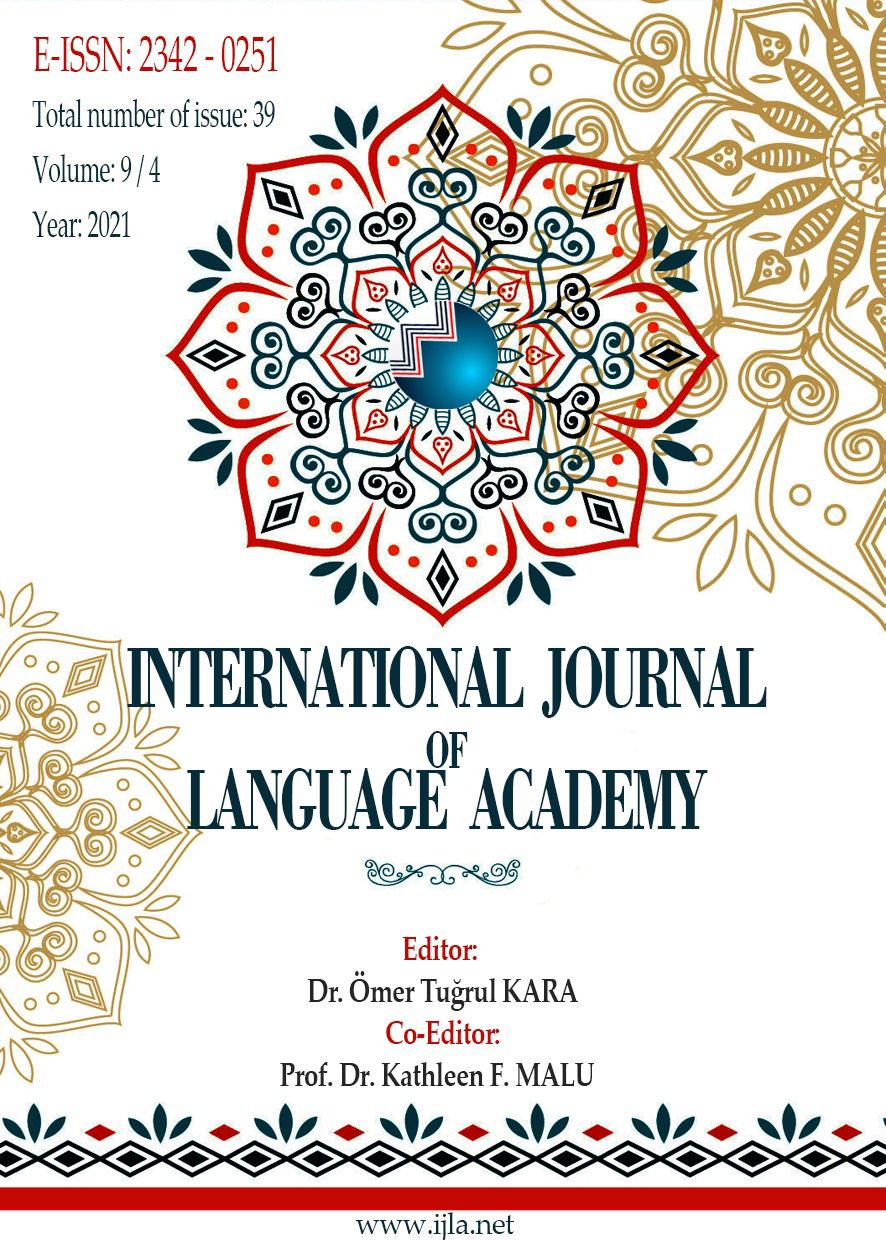Author :
Abstract
Dijital okuryazarlık becerisi dünya vatandaşı olarak adlandırılan bireylerde olması gereken önemli yeterliliklerin başında gelmektedir. Her tür dijital teknolojiyi eleştirel kullanma ve ortaya dijital bazlı ürün koyma becerisi olarak ifade edilen dijital okuryazarlık becerisinin eğitim kurumlarında sistemli bir anlayışla kazandırılması oldukça önemlidir. Ülkemizde de bu beceri özellikle birinci ve ikinci kademede Sosyal Bilgiler Öğretim Programı aracılığıyla öğrencilere kazandırılmaya çalışılmaktadır. Bu çalışmanın amacı da sosyal bilgiler dersini almış ortaokul öğrencilerinin dijital okuryazarlık becerisi ile ilgili görüşlerini tespit etmektir. Araştırmanın çalışma grubunu Van ilinde bulunan üç farklı ortaokulda öğrenim gören 12 ortaokul öğrencisi oluşturmaktadır. Örneklem seçiminde amaçlı örneklem yönteminden biri olan ölçüt örnekleme kullanılmıştır. Çalışma nitel ve betimsel bir çalışmadır. Çalışma kapsamında öğrencilerden veri toplamak için yapılandırılmış görüşme formları kullanılmıştır. Elde edilen veriler içerik analiz yöntemi ile çözümlenmiştir. Araştırma sonucunda elde edilen bulgular incelendiğinde; öğrencilerin çoğunluğunun bilgiye ulaşmak için bilgisayar ve cep telefonu kullandıkları; bilgiye erişmek için güvenli siteleri tercih ettikleri; edilen bilgilerin güvenilirliğini farklı sitelerle karşılaştırma yaparak teyit ettikleri; ziyaret ettikleri sitelerin güvenlik onayına sahip olup olmadığına dikkat ettikleri; dijital teknolojiyi kullanarak yaptıkları en yaygın etkinliğin power point (ppt) oluşturmak olduğu tespit edilmiştir. Genel olarak sosyal bilgiler dersini almış olan ortaokul öğrencilerinin dijital okuryazarlık becerisini oluşturan yeterlilikler konusunda bilgi sahibi oldukları görülmüştür.
Keywords
Abstract
The “digital literacy” skill is one of the most critical competencies that individuals called world citizens must have. It is crucial to earning students digital literacy skills, expressed as the ability to critically use all kinds of digital technology and produce digital-based products systematically in educational institutions. In our country, the students, especially in the first and second stages, are expected to acquire this skill through the Social Studies Curriculum. This study aims to determine secondary school students’ opinions who have taken the social studies course about digital literacy skills. The research study group consists of 12 secondary school students studying in three different secondary schools in Van. Criterion sampling, one of the purposive sampling methods, was conducted in the selection of the sample. The study is a qualitative and descriptive one. Within the scope of the study, structured interview forms were used to collect data from the students. The obtained data were analyzed with the content analysis method. When the findings obtained as a result of the research were examined, it was determined that the majority of students use computers and mobile phones to access information; they prefer secure sites to access information; they confirm the reliability of the information provided by comparing them with different sites; they pay attention to whether the sites they visit have security approval; the most common activity they do use digital technology is to create a powerpoint (ppt). In general, it has been observed that secondary school students who have taken the social studies course are knowledgeable about the competencies that make up their digital literacy skills.
Keywords
- Akdağ, H. ve Çoklar, A., N. (2009). İlköğretim 6. ve 7. sınıf öğrencilerinin sosyal bilgiler dersi proje ve performans görevlerini hazırlarken yararlandıkları kaynaklar, internetin yeri ve karşılaştıkları güçlükler. Adıyaman Üniversitesi Sosyal Bilimler Enstitüsü Dergisi, 2(2), 1-16.
- Avcı, K, E. ve Melike, F. (2018). 4. ve 5. sınıf sosyal bilgiler ders kitapları “etkin vatandaşlık” öğrenme alanında yer alan becerilerin ve değerlerin incelenmesi . Uluslararası Sosyal Bilgilerde Yeni Yaklaşımlar Dergisi, 2(1), 1-21.
- Büyüköztürk, Ş., Kılıç Çakmak, E., Akgün, Ö. E., Karadeniz, Ş., & Demirel, F. (2020). Eğitimde bilimsel araştırma yöntemleri (28. baskı). Ankara: Pegem Yayınları.
- Datareportal (2021). Digital 2021: Turkey. Erişim tarihi: 08.09.2021, https://datareportal.com/reports/digital-2021-turkey
- Ekici, S. Uçak, Ö, N. (2012). İlköğretim öğrencilerinin internet'te bilgi arama davranışları. Türk Kütüphaneciliği, 26 (1), 78-96.
- Eshet-Alkalaı, Y. (2004). Digital literacy: a conceptual framework for survival skills in the digital era. Jl. of Educational Multimedia and Hypermedia , 13 (1), 93-106. Erişim tarihi: 15.10.2021,
- Gilster, P. (1997). Digital literacy. New York: Wiley Computer Pub.
- Görmez, E. (2014). Ortaokul öğrencilerinin medya okuryazarlığı düzeyleri (Yayınlanmamış Doktora Tezi). Atatürk Üniversitesi Eğitim Bilimleri Enstitüsü, Erzurum.
- Guinee, K. (2004). Internet searching by K-12 students: a research-based process model. Erişim tarihi: 03.09.2021,
- Henkoğlu, Ş, H. Mahiroğlu, A. Keser, H. (2015). Ortaokul öğrencilerinin bilgiye erişim aracı olarak internete yaklaşımları. Turkish Online Journal of Qualitative Inquiry. 6 (1), 72110.
- Karabacak, Z., İ. ve Sezgin, A., A. (2019). Türkiye’de dijital dönüşüm ve dijital okuryazarlık. Türk İdare Dergisi, 91 (488), 319-343.
- Kuru, E. (2019). Sosyal bilgiler öğretmen adaylarının dijital okuryazarlık kavramına ilişkin görüşleri. Turkish Studies, 14 (3), 1629-1648.
- Lundhy, S., E. (2014). Leveraging digital technology in social studies education. doctor of education in educational leadership: curriculum and ınstruction. Portland state university.
- Misirli, Z., A. (2015). Ortaokul öğrencilerinin eğitim teknolojisi standartlarına ilişkin yeterliklerinin incelenmesi. Uluslararası Türk Eğitim Bilimleri Dergisi, 13 (2), 311
- Pala, Ş. M. Başıbüyük, A. (2020). Ortaokul beşinci sınıf öğrencilerinin dijital okuryazarlık düzeylerinin incelenmesi. Cumhuriyet International Journal of Education, 9(3), 897921. http://dx.doi.org/10.30703/cije.672882.
- Patton, M. Q. (2014). Nitel araştırma ve değerlendirme yöntemleri (M. Bütün ve S. B. Demir, çev.). Ankara: Pegem Akademi.
- Ribble, M. (2011) Digital citizenship in schools ISTE & Eurospan. London: isbn 978-1-56484- 301-2, 166.
- Son, J.-B. (2015). Digital literacy. Erişim tarihi: 08.09.2021, https://drjbson.com/projects/dl/
- Spires, H., & Bartlett, M. (2012). Digital literacies and learning: Designing a path forward. Friday Institute White Paper Series. NC State University.
- Tavşancıl, E. ve Aslan, E. (2001). Sözel, yazılı ve diğer materyaller için içerik analizi ve uygulama örnekleri. İstanbul: Epsilon Yayınevi.
- Tor, H. ve Erden, O. (2002). İlköğretim öğrencilerinin bilgi teknolojilerinden yararlanma düzeyleri üzerine bir araştırma. The Turkish Online Journal of Educational Technology. 3(1), 120-130. Erişim tarihi: 03.09.2021 http://tojet.net/articles/v3i1/3116.pdf.
- Yalçınalp, S. Aşkar, P. (2012). Öğrencilerin bilgi arama amacıyla internet’i kullanım biçimlerinin incelenmesi. The Turkish Online Journal of Educational Technology, 2(4), 100-107.
- Yaman, C. (2019). Sosyal bilgiler öğretmen adaylarının dijital okuryazarlık düzeylerinin incelenmesi (Yayımlanmamış Yüksek Lisans Tezi). Ömer Halisdemir Üniversitesi Eğitim Bilimleri Enstitüsü Türkçe ve Sosyal Bilimler Eğitimi Ana Bilim Dalı, Niğde.
- Yıldırım, A. Şimşek, H. (2018). Sosyal bilimlerde nitel araştırma yöntemleri. Ankara: Seçkin Yayıncılık.





